Appendix
C: Analysis of
articles using Indigenous knowledge translation framework
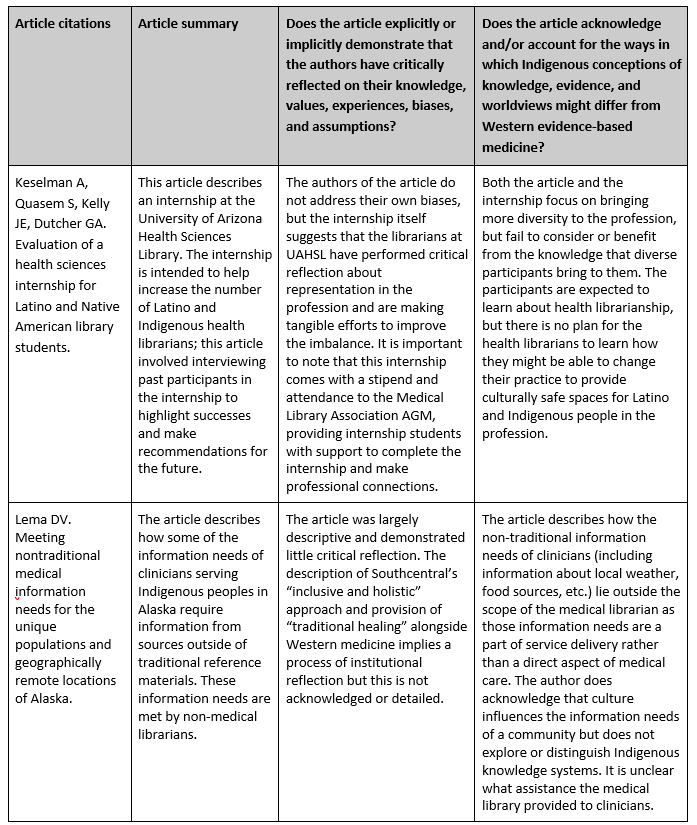
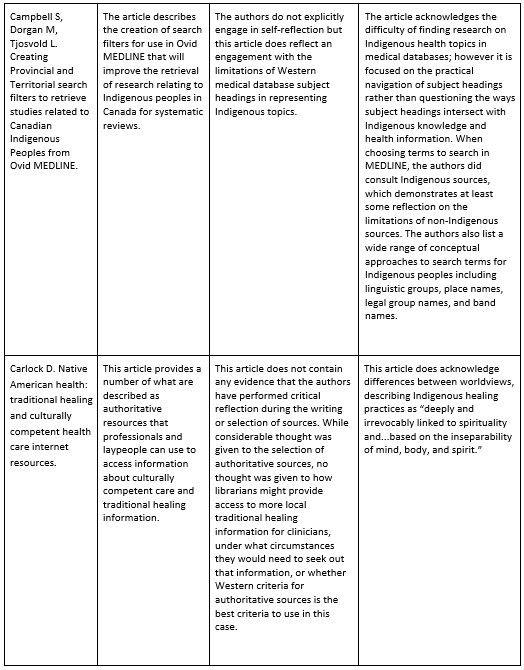
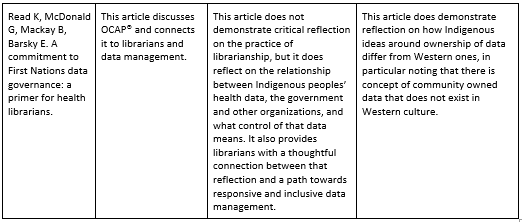
Adair Harper. MLIS
Graduate Student, University of British Columbia, BC
Eleri Staiger-Williams. MLIS Graduate Student,
University of British Columbia, BC
This article was the recipient of the 2019
JCHLA / JABSC Student Paper Prize. This article has been
peer-reviewed.
The Truth and Reconciliation Commission of Canada’s (TRC) Call to Action 22 recommends that “those who can effect change within the Canadian health-care system [should] recognize the value of Aboriginal healing practices” [1] . While research has shown that health librarians have the ability to implement change [3], to what extent have health library professionals shifted their practice to make space for not only these “Aboriginal healing practices” but also the Indigenous peoples and knowledge systems those practices are so closely tied to? The contemporary state of Canada is home to a rich diversity of First Nations, Inuit, and Metis groups whose knowledge systems reflect unique and evolving ways of understanding the world which we refer to here as “worldview.” While we acknowledge the importance of recognizing the diversity of specific Indigenous cultures and knowledge systems, for the purposes of this paper we will use the broader term “Indigenous.” By using the phrase “making space,” we introduce the possibility that there can be multiple ways of knowing beyond the evidence-based traditions of Western medical science and that the Indigenous ways of knowing that underpin Indigenous healing practices deserve to be respected and considered alongside Western medicine, as per TRC Call to Action 22. It is also important to note here that for health librarians this means moving beyond simply providing access to knowledge about Indigenous peoples in order to work towards a more substantial structural and professional shift in health librarianship that is better able to accommodate, support, and amplify Indigenous healing knowledge. For this reason we sought to assess the current health library literature in order to determine whether it reflects this shift in professional practice.
In June 2008 the Canadian Government established the TRC with then Prime Minister Stephen Harper issuing a formal apology shortly thereafter; this marked the beginning of a considerable shift in public conversation about Canada’s historical, political, and cultural relationship with Indigenous peoples. Since the release of the TRC’s Calls to Action in 2015 [1], many institutions, organizations, and individuals in Canada have considered ways to address these calls and, ultimately, a range of systemic inequalities within Canadian society. Several calls to action are directed towards the healthcare system including Call 22 which states: “We call upon those who can effect change within the Canadian health-care system to recognize the value of Aboriginal healing practices and use them in the treatment of Aboriginal patients in collaboration with Aboriginal healers and Elders where requested by Aboriginal patients.” [1] On an international level, the United Nations Declaration on the Rights of Indigenous Peoples affirms both the individual and collective rights of Indigenous peoples, including Article 24 which emphasizes that Indigenous peoples maintain the right to their traditional health practices and equal access to all health services without discrimination [4].
There is strong evidence that health librarians can have a positive impact on health outcomes; in large part by providing health professionals with access to current research that improves treatment practices and patient safety [3]. Here, we argue that health librarians should take actions to effect change by considering how to advance this call. Recent research has shown that health libraries are providing more information about Indigenous health to their users [5], but it is less clear the extent to which health librarians understand and value Indigenous healing practices. It is challenging to understand Indigenous health issues without exploring how they are embedded within and impacted by Indigenous knowledge systems and ways of being. As non-Indigenous MLIS students, we recognize that our understanding of Indigenous knowledge systems does not stem from our own lived experiences, but rather continues to evolve as we learn more from Indigenous people. For this reason we follow a model aimed at “readers from diverse backgrounds” that is outlined in an article co-written by Indigenous health professional Janet Smylie [2], centring our article analysis around a set of self-reflective questions. In this limited way we hope to amplify the perspectives of Indigenous knowledge workers during our examination of the current practice of health librarianship given the recommendations of the TRC in Canada.
Indigenous health knowledge can differ from Western medical knowledge; for librarians who are interested in including Indigenous knowledge and perspectives in their libraries, it is important to consider some of these differences and to self-reflect on how their personal identity and professional position intersect with these different ways of knowing. Heiltsuk librarian Kim Lawson argues that academic research has been traditionally focused more on “what First Nations know rather than how they know it” [emphasis in original, 6]. Lawson distinguishes between Indigenous knowledge and Indigenous information in that the former is embedded within “cultural, juridical, historical, social or personal context” while the latter has lost meaning as it has been extracted from its cultural context [6]. To reflect the holistic nature of Indigenous healing practices, throughout this paper we will make reference to Indigenous knowledge.
In a Canadian health context, Smylie et al reiterate this idea that “knowing” and “doing” are “intertwined and indistinguishable” [2]. In Western medicine, the process of “knowledge translation” (KT) seeks to bridge the gap between knowledge and action [7]. While this process of transforming knowledge into action now represents a growing area of health research [2, 8], these principles have long been a part of Indigenous knowledge systems; these Indigenous practices should be acknowledged and communities respectfully engaged within health knowledge projects [9]. Kaplan-Myrth and Smylie [10] define KT in Indigenous contexts as ‘‘Indigenously led sharing of culturally relevant and useful health information, and practices to improve Indigenous health status, policy, services, and programs.” As such, in this paper we seek to support both Indigenous KT and Indigenous knowledge in the context of health librarianship.
Smylie et al. use a critical question-posing approach to explore the application of Indigenous KT principles into health library practice [2]. Key to this approach is the concept of cultural safety, which calls on health care professionals to reflect on personal, institutional, and systemic power imbalances and biases in order to effect change that is ultimately aimed at creating a more respectful health care system for all [11]. For an introduction to cultural safety and related concepts, please see Appendix A. Engaging in such self-reflection highlights the diverse ways people conceptualize, relate to, and access health information. We take up Smylie et al.’s call to engage in critical self-reflection by using their critical-question posing approach [2] as a basis for an examination of the current health library literature.
In this literature review, we sought to assess changes within health library practice by seeking articles that went beyond simply reporting on Indigenous health topics. Instead we focused on papers that had practice implications related to the recognition of Indigenous healing practices. This included papers that utilized, described, or suggested ways that health librarians can move towards more culturally safe practices when dealing with Indigenous materials and topics.
To discover articles related to health librarianship, we first identified three journals based on several selection criteria. We restricted our search to English-language journals specific to the practice of health librarianship and published in North America. With these restrictions, we identified the Journal of the Medical Library Association (JMLA), Medical Reference Services Quarterly (MRSQ), and the Journal of the Canadian Health Libraries Association / Journal de l'Association des bibliothèques de la santé (JCHLA/JABSC). These were identified through both discussion with a health librarian, as well as through the descriptions of the journals. As we were looking to find articles about the practice of health librarianship as represented in professional scholarly journals, we ruled out adjacent publications such as Health Informatics as well as grey literature. This approach limited the number of journals and articles we had to examine, which was important due to time constraints.
We began our search by identifying a number of keywords and controlled terms for use in the Ovid MEDLINE and CINAHL databases; the former indexes JMLA and MRSQ, while the latter indexes JCHLA. Please see Appendix B for a complete list of search terms, Boolean terms, and result numbers. We identified search terms through HLWIKI [12], UBC Indigenous Peoples Language Guidelines [13], and the Lowitja Institute [14]. Some terms contain outdated language, but we included them to maximize retrieval. In addition, some more specific terms such as names for tribes were excluded due to their very specific subject; we were not expecting to retrieve many articles and wanted to use the broadest possible terms. Following PRISMA guidelines, our initial number of search results was 292 235 in Ovid MEDLINE and 42 308 in CINAHL without any limitations or filters added. Given the journal specifications outlined above, we did not check for duplicates at this stage, but rather proceeded to apply journal filters. At this point we retrieved 8 articles from JMLA, 2 from MRSQ, and 14 from JCHLA. Upon our examination of the JCHLA articles from CINAHL, we discovered that the 2017 issue of the journal was not indexed, and therefore we hand searched that issue through the Canadian Health Libraries Association website. With our 24 identified articles, we excluded those that were older than 10 years. We also excluded articles that primarily focused on the provision of services to Indigenous peoples; this maintained our focus on articles which explicitly or implicitly discussed practice changes that have the potential to make health libraries culturally safer for Indigenous people and more inclusive of Indigenous knowledge. We recognize that these criteria did rule out some historically significant papers such as Tribal connection health information outreach: results, evaluation, and challenges [15]. This left us with a total of 5 articles which we qualitatively analysed. Per reviewer suggestions, we re-ran the search with the additional term “Metis” in August 2019, but we found no additional papers to analyse.
In our analysis we explored how non-Indigenous medical institutions, and by extension libraries, might better acknowledge and facilitate access to Indigenous healing practices. In order to centre Indigenous perspectives in our analysis, we used the principles and strategies that are outlined in Smylie et al.’s paper Sharing what we know about living a good life: Indigenous approaches to knowledge translation [2]. Although Smylie herself is not a librarian, her Indigenous identity and health background provide a valuable perspective and the publication of this article in the Journal of Canadian Health Libraries situates this approach within the health library literature. Following Smylie et al.’s approach [2], each author reviewed the selected papers, making note of our responses to each question, and then we came together to discuss our findings until we reached a consensus. We analyzed each of the selected papers using the following questions:
• Does the article explicitly or implicitly demonstrate that the authors have critically reflected on their knowledge, values, experiences, biases, and assumptions?
• Does the article acknowledge and (or) account for the ways in which Indigenous conceptions of knowledge, evidence, and worldviews might differ from traditional evidence-based medicine?
These two questions are based on Smylie et al.’s suggestions for critical self-reflection on cultural safety and health literacy [2] as these concepts seem most directly in alignment with the TRC Call to Action 22 [1]. We acknowledge that these questions facilitate a process of critical reflection that is inherently subjective; we argue that this subjectivity serves as a perhaps uncomfortable but nonetheless essential aspect of examining our personal, professional, and institutional biases. Some particular characteristics that we looked for in order to answer these questions were mention of Indigenous ways of knowing, land acknowledgements, and reflection on the relationship between Western health librarianship perspectives and Indigenous health knowledge.
The papers that we selected covered a broad range of topics, including an internship created for Indigenous and Latino librarian students [16], finding information about Indigenous peoples, Indigenous information needs [17-19], and data management [20]. Using the critical questions listed above, we found that most of the article authors did not explicitly engage in self-reflection. A number of the articles that fit our criteria did acknowledge that there are differences between Indigenous and Western knowledge, however few of these articles demonstrated how this difference impacted their practice. The detailed results of our analysis are available in Appendix C.
Overall, while there are increasing numbers of articles in the health library literature about Indigenous topics, few reflect a significant acknowledgement of the distinctiveness and value of Indigenous healing practices or the knowledge keepers and systems that uphold these practices. Informed by Indigenous KT principles, the questions we used to analyze these papers provided an opportunity to critically reflect on the current research literature. Only one paper, A commitment to First Nations data governance: a primer for health librarians [20], demonstrated a more substantial engagement with Indigenous knowledge. Both this article and the paper Evaluation of a health sciences internship for Latino and Native American library student [16], suggested potential changes in health library practice. For a brief summary of these papers, please see Appendix C.
Of the 5 articles we examined, 3 were related to the retrieval of information pertaining to Indigenous health topics in some way. Generally, these articles focused on providing information about the accomplishment of a specific information retrieval task relating to Indigenous topics. As discussed by Campbell et al. [18], there are a number of barriers when it comes to finding Indigenous information in health literature, including a range of terminology and naming practices and a lack of consistently applied medical subject headings. Developing strategies to find research on Indigenous health topics is important, but this approach alone does not necessarily reflect a deeper engagement with the ideas of cultural safety and principles of Indigneous KT such as those outlined by Smylie et al. [2,7]. This type of reflective engagement is particularly important given the demographic breakdown of the library profession. None of the authors of these papers directly identified as Indigenous or non-Indigenous; however, in 2017 the American Library Association reported that only 1.2% of its members identified as American Indian or Alaskan Native [21]. In Canada, the Canadian Association of Professional Academic Librarians reported in 2016 that Indigenous membership was increasing, with 5% of librarians from ages 20 to 30 identifying as Indigenous [22]. Given the low numbers of Indigenous librarians, it is especially important to work towards cultural safety in health librarianship.
Most of the authors did not explicitly engage in a process of self-reflection about how their personal, institutional, and cultural assumptions and biases impacted their work with Indigenous health topics. While the authors explicitly or implicitly acknowledged the health disparities between Indigenous peoples and the general population in North America, they provided little cultural, social, or historical insight to contextualize the systemic roots of these inequalities and acknowledge the ongoing power dynamics between two fundamentally different knowledge systems. By not explicitly addressing this context it was difficult to assess whether the authors considered Indigenous perspectives or health outcome priorities.
The article that best exemplified the process of critical reflection was Kevin Read, Gail McDonald, and Eugene Barsky’s paper A commitment to First Nations data governance: a primer for health librarians [20], published in the Journal of the Canadian Health Libraries Association / Journal de l'Association des bibliothèques de la santé. By detailing the First Nations Information Governance principles of Ownership, Control, Access, and Possession (OCAP®) and making direct links to how these ideas can be used by health librarians, Read et al. not only highlight an Indigenous approach to information governance, but also reflect on how and why health librarians should make space for Indigenous health knowledge.
We have identified several limitations to this paper. Firstly, given that we originally developed this paper as a health libraries class assignment, the authors were limited by scope and time boundaries. Secondly, we are non-Indigenous, which means that we have inevitably brought our implicit biases to this literature review and analysis. Finally, the limitations on scope and time led to only a small number of journals being searched with a very narrow criteria; this means that it is likely that some content relevant to our question has been unintentionally excluded. The topic of Indigenous health information is inherently multidisciplinary; we acknowledge that our exclusive focus on health librarianship publications excludes relevant content from grey literature and adjacent disciplines. A more comprehensive examination of the literature was beyond the scope of this paper but could provide valuable perspective.
Given our paper’s finding of a limited amount of health library literature on Indigenous knowledge, we suggest that further research and reflection is needed in order to continue this professional conversation. We also suggest that health librarians consider using a self-reflective framework, such as the one used in this paper, to consider the value and impact of Indigenous knowledge in health settings and to examine their personal and institutional biases—especially when developing collections and planning research on Indigenous topics. Within such a reflective process we encourage librarians to consider the institutional, geographical, and historical contexts that have shaped the relationship between Indigenous peoples and colonial institutions including the health system and libraries. Finally, we recommend that health librarians not only read and cite Indigenous perspectives on health knowledge whenever possible including organizational efforts such as OCAP®, but also find ways to engage with and support leadership from Indigenous knowledge holders.
TRC Call to Action 22 asks those who can effect change in the healthcare system to recognize the value of and provide access to Indigenous health knowledge [1]. Health librarians are implicated here despite the fact that there is limited research on how they might more meaningfully engage with sources of Indigenous knowledge. We suggest that health librarians can critically reflect, both personally and through their national association, regarding changes in professional practice that have the potential to make health libraries safer places for Indigenous peoples and reflect a deeper respect for their knowledge systems. This self-reflective practice is informed by principles of cultural safety and asks health librarians to consider the ways in which a wide range of systemic forces affect the work that they do. We acknowledge that there is already a significant burden of work placed on health librarians; however, given current health disparities between Indigenous and non-Indigenous peoples and the gravity and importance of the TRC’s Calls to Action, we believe this reflective practice must be prioritized in order to move towards the Canadian Health Libraries Association/Association des bibliothèques de la santé du Canada’s vision of meaningful library partnership in the “improvement of health, health care, research, and education.” [23] We hope that readers of this paper use it to both spark discussion about their own practices relating to Indigenous knowledge and to consider the priorities for health libraries moving forward.
No competing interests declared.
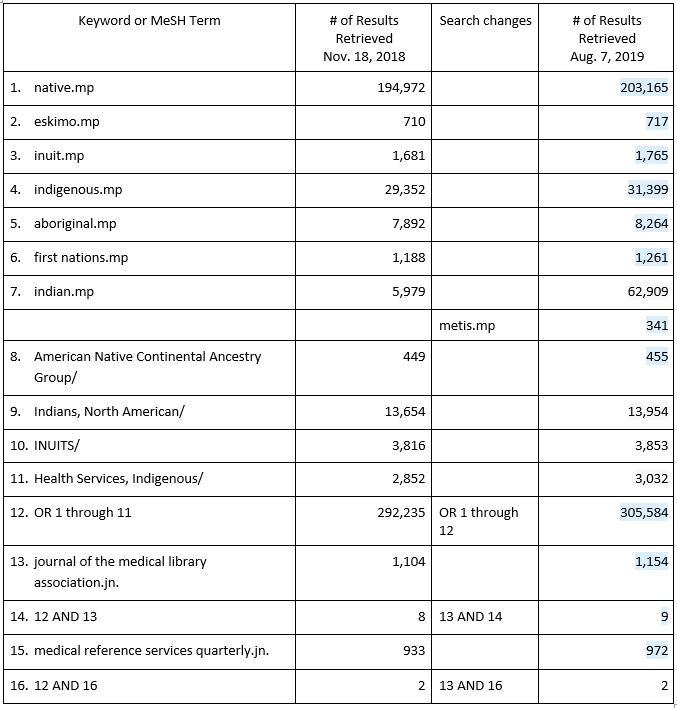
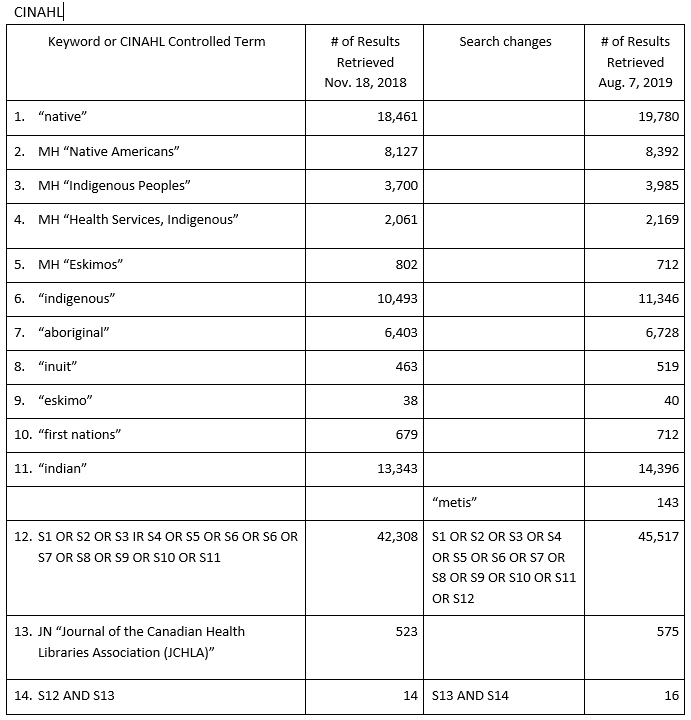
Appendix
C: Analysis of
articles using Indigenous knowledge translation framework


